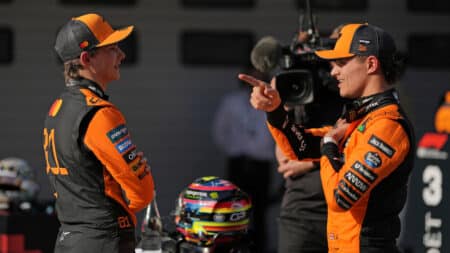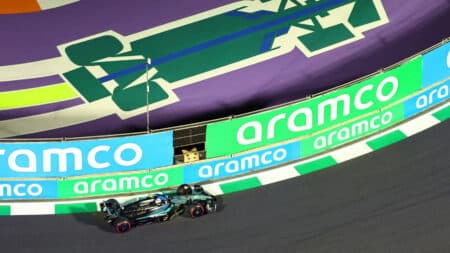
Norris must deal with Piastri's pace – or suffer Mark Webber's fate
As Oscar Piastri moved into the championship lead, his manager Mark Webber's example should serve as a warning to Lando Norris, says Mark Hughes
Now that the full extent of Renault Sport’s energy recovery problems are becoming evident, so the clouds are parting to reveal why Bernie Ecclestone seems intent on pursuing the hugely unpopular double-points idea.
It’s clear from all the noises emanating from Renault Sport and its partner teams – Red Bull, Lotus, Caterham and Toro Rosso – that the French engine manufacturer really is in a substantial amount of bother with its energy recovery technology. Unofficial reports are suggesting it may be as long as 20 weeks before the permanent fix required can be in place – which, if true, would take us to half-way through the season.
Red Bull team principal Christian Horner pointed out from the Bahrain tests – where the Renault-engined cars, restricted to only a fraction of the theoretical maximum ERS energy, were up to 20mph slower down the straights than the Mercedes and Ferrari-engined cars – the piece of history he believes has proved crucial in Renault’s current difficulties.
When the first generation of energy recovery was introduced to F1 – KERS in 2009 – Ferrari and Mercedes developed it in-house from within their respective engine departments, albeit in association with Magneti Marelli in Ferrari’s case. By contrast, Renault Sport did not; instead the development of the KERS unit was carried out by what was then the Renault-badged team at Enstone.
Horner believes that set of circumstances has allowed the Ferrari and Mercedes engine departments to gain a vital head start in the technology. The Enstone team still exists of course, now badged as Lotus, but those involved in designing and developing the KERS project back then have not been part of Renault Sport’s power unit programme in Viry.
Technical director at the Enstone team at the time was Bob Bell, now installed in a similar position at Mercedes, and he recalled the KERS programme there with some pride at the time, saying: “During the planning of the car Flavio [Briatore] was convinced the teams were not going to agree to KERS because of the costs involved, so we only did lip service to its development initially. Then it became clear that it was going to be needed after all and we had to do quite a lot in a condensed period.
“Of all the things we’ve done in recent years to be proud of, that project is one of them because with our four-person team we created a system that was as good as anyone else’s and completely reliable.” Mercedes and Ferrari both acknowledge that developing those KERS units – both the first generation units in 2009 and the subsequent developments used from 2011-13 – proved to be key building blocks to developing the current more powerful systems.
Given the close relationship between Horner and Ecclestone, it’s inconceivable that Bernie would not be fully appraised of Renault’s current difficulties and how long they may take to fix. Bernie is F1’s promoter, so feels he needs a contest to sell. What better one than an early-season points lead of a Mercedes or Ferrari-engined driver being eroded fast by a suddenly on-form Red Bull, all reaching a climactic conclusion right at the end?
Hence his initial idea of a double points finale has now given way to double points for the last three events. If we look at the 19-race calendar, the amount of time being talked about to properly cure the Renault would potentially see the pukka unit in the cars by Silverstone, round nine. If the points value of the last three races is doubled (effectively making them six races), it means the Red Bull could potentially enjoy the equivalent of 14 on-form races (rather than 11) to negate its eight off-form early-season events.
Competitively weighting the championship in this way has understandably met with almost universal derision. Even Red Bull’s Adrian Newey and Sebastian Vettel have spoken out against the idea. But Horner has said, “it would certainly take away the lottery element of that last race,” thereby seeming to give Bernie’s idea his tacit approval. Wonder why that might be?
This crazy plan has to be stopped. In theory the double points idea needs the unanimous support of all the teams – and of Jean Todt at the FIA – for it to be enshrined in the regulations before the season starts. Many of the teams do not share Bernie’s enthusiasm for the idea so one might normally suppose this would ensure it wouldn’t happen and sanity would prevail. But don’t bet on it. Bernie has many devices of influence.
More from Mark Hughes
The Villeneuves at Trois-Rivières
Kevin Magnussen impressing McLaren
Has the Red Bull era come to an end?

As Oscar Piastri moved into the championship lead, his manager Mark Webber's example should serve as a warning to Lando Norris, says Mark Hughes

General Motors has pushed back its F1 entry as an engine supplier to 2029, but what does it mean?

As Mercedes dropped down the F1 order in Saudi Arabia, team boss Toto Wolff found a hope in Kimi Antonelli's performance for the team

Zak Brown is still adamant on his approach that Lando Norris and Oscar Piastri are ‘number ones’ at McLaren. But how long will it be before history repeats itself and takes a sour turn?